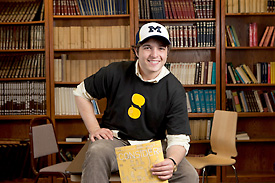More online
Consider has stirred debate, and its organizers are pleased.
Reappearance of the four-page, student-run point-counterpoint publication on campus has inspired people across the university to initiate dialogue. Consider came back a year-and-a-half ago, after a two-year hiatus.
Now, 1,500 issues are published 20 times a year. Issues span the local, national and world stage, with recent topics including stereotypes on campus, the censoring of “Huckleberry Finn,” whether or not to legalize marijuana in Ann Arbor, immigration and returning Native American artifacts.
The concept is simple: The publication selects an issue then presents two viewpoints by faculty, students or a related organization.
“The original idea was for it to be easy to read and accessible,” says Zachary Berlin, editor-in-chief of Consider, and a junior at the Gerald R. Ford School of Public Policy. “It exists now to encourage civil discourse on campus.”
What started with a handful of students quickly evolved into a group of more than 20, all interested in rebuilding the publication. Their backgrounds vary widely, including political science, art and history.

U-M junior Zachary Berlin is editor-in-chief of Consider, a student-run point-counterpoint publication. “It exists now to encourage civil discourse on campus.” Photo by Scott Soderberg, U-M Photo Services.
The publication has its roots in the fall of 1983, when a small core group of students — none of them journalism majors — decided to create Consider. Within weeks the staff was distributing 10,000 copies across campus.
Brian Sher, then a political science senior, was anxious to fill a gap felt by many on campus.
“This was an opportunity to address tough issues and help create conversation on campus around those issues,” says Sher, cofounder of Consider and managing editor in its first year. “The format of Consider is not much different today from when we started publication. We keep it short, five-to-10 minutes of reading to make it accessible.”
Since the restart, Consider has received national attention and other universities have expressed interest in bringing Consider to their campus.

“People with a different voice should be able to speak freely,” says Berlin, who acknowledges the political implications of various news sources and the access to social media like Twitter and Facebook. “(Many people) only have time to read what’s relevant to them. And this polarizes world discourse.
“If I hear both sides of an issue, I can solidify my viewpoint and have more of an identity,” Berlin says. “Consider exposes people to these viewpoints.”
Sher agrees. “Consider offers a chance to show there is more than one side that is well thought through in a given situation; it gives exposure to a viewpoint that you may not agree with. If you’re always looking at something from same viewpoint, you’ll miss out on real opportunities for dialogue.”
Consider has become popular with faculty members who have asked to use the publication as a teaching tool in class.
“The university campus is a place where new ideas should always be accepted into discussion, inside and outside of the classroom,” Berlin says. “In class, if an issue becomes too polarized, sometimes an instructor will shut it down. But we want people to know it’s OK to have these discussions.”
While the core mission of Consider has stayed true over the years, the publication has experienced some change, Sher says.
“Early on, we were literally hand cranking our publication. Physical labor associated with it that created a sense of community that’s now hard to duplicate,” he says. “The hours required to put out a publication were greater. Much of that is automated now.”
Also, the publication now is available at consideronline.org, and on Facebook and Twitter, reaching a vast online audience, making it accessible to both students on this campus and around the world, Berlin says.
A nonpartisan, nonprofit publication, Consider is sponsored by Hillel, the Michigan Student Assembly, the Frances Willson Thompson Library, LSA Student Government, the Center for Ethics in Public Life and the Office of the President.
Sher, an attorney in Chicago, remains committed to Consider. While he’s not formally involved, he’s on the board of trustees at Hillel and participates in a mentoring program, in which Berlin is his mentee.
What advice does Sher have for Berlin?
“To keep on doing what he’s doing,” Sher says. “He pursues everything with a passion that’s spectacular.”

